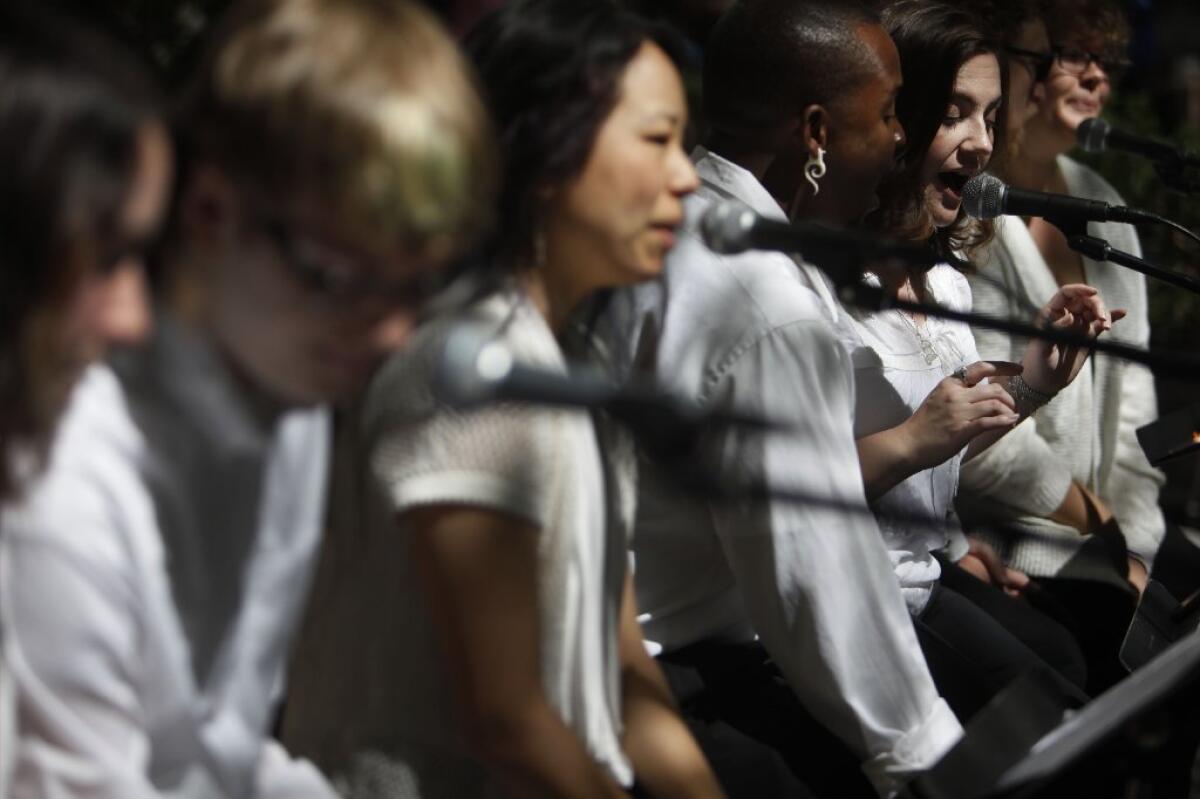L.A. Phil’s Minimalist Jukebox has maximum exposure in the Southland

- Share via
“This primitivistic music goes on and on,” the prescient San Francisco Chronicle music and art critic Alfred Frankenstein wrote in his 1964 review of the premiere of Terry Riley’s “In C.”
“At times you feel you have never done anything all your life long but listen to this music and as if that is all there is or ever will be, but it is altogether absorbing, exciting, and moving, too,” he continued.
Saturday afternoon, in a special installation/performance at the Hammer Museum that helped kick off the first full weekend of the Los Angeles Philharmonic’s Minimalist Jukebox festival, this primitivistic music went on and on for four hours. It was altogether absorbing and exciting. And moving, too. Moving all over the place.
Musicians played in the Hammer courtyard. Giant air dancers, tubes shaped like Keith Haring figures set in motion by fans, bopped to the delight of children who frolicked around them as if on a playground. Members of Danielle Agami’s Ate9 dANCEcOMPANY moved through the crowd as well, all afternoon. The audience was given permission to wander, dine, come and go, do pretty much anything it wanted.
Unless a bolt out of blue hits the musical world between now and Nov. 4, Riley’s controlled improvisation of 53 melodic fragments built around the key of C and regulated by a continual pulse will have the distinction of being the most influential work of the past half-century and the most unlikely one.
Although the 28-year-old composer and pianist had been fooling around for the previous five years with a new, hypnotically reductive music made either of long tones or rapidly repeated patterns, “In C” proved precisely the right music for the right moment.
Its premiere at the San Francisco Tape Music Center, a small alternative space, was the day after Lyndon B. Johnson had been elected president. The country was still coming out of its gloom following the assassination of John F. Kennedy.
“In C” was not only “Like None Other on Earth,” as the headline in the Chronicle proclaimed, but it also lifted spirits like the typical contemporary music of the time was not intended to do. Here was process music that seemed unprocessed, free and natural.
But no one at the time could possibly have been so prescient as to envision what Riley’s invention wrought and continues to do.
Eight years ago, the L.A. Phil first plugged in a Minimalist Jukebox at Walt Disney Concert Hall at a time when it was still thought radical for a symphony orchestra to do so, despite the popularity of such key composers as Philip Glass and Steve Reich and their influence on the next generation, and particularly John Adams.
Now the festival is back, headed as was the first by Adams, and bigger than ever, spilling out of Disney and across the Southland.
No one wants to miss a beat. Saturday I heard more “In C” at the L.A. Phil’s Toyota Symphonies for Youth program delighting children and adults. Jacaranda Music in Santa Monica revived the music that David Byrne wrote for Robert Wilson’s “the CIVIL warS,” an epic, multi-part, multinational, multi-composer opera that had been intended for the 1984 Los Angeles Olympic Arts Festival, with Glass’ score to the feature film “Mishima” also on the program.
Sunday night, the Los Angeles Master Chorale programmed Reich’s “You Are Variations” and David Lang’s “the little match girl passion.”
Indeed, last weekend Minimalism seemed everywhere and welcome for all occasions. The Hammer’s “In C” installation was conceived by Yuval Sharon and used the resources of his experimental opera company, the Industry.
Over the four hours, a range of intriguing singers and instrumentalists from various disciplines joined in for three complete performances of “In C” (Riley’s score allows any combination of any instruments), winding up with a joyous finale that included everything from toy piano to rock drum set. It will be repeated Saturday, this time with Riley in attendance.
Jacaranda’s concert at First Presbyterian Church of Santa Monica was an example of Minimalism’s entry into popular culture in the early 1980s. Byrne’s “The Knee Plays” — the entr’actes to Wilson’s opera — was written for the Dirty Dozen Brass Band of New Orleans and with the composer as narrator. “Mishima” was Glass’ first Hollywood film score.
Performances were sometimes tentative, and Fran Kranz, who read Byrne’s wry text, was undone by poor amplification. But the music retained its allure.
The Master Chorale’s contribution at Disney on Sunday night was spiritual profundity. Music director Grant Gershon began a gorgeous performance of an “Ave Maria” by the Renaissance Spanish composer Tomàs Luis da Vittoria in memory of the Chorale’s music director emeritus, Paul Salamunovich, who died Thursday. But this and a performance of Pèrotin’s 13th century “Siderunt Principes” were also remembrances of Minimalism’s fondness for things far past.
Lang’s 2007 “the little match girl passion” has a slightly more recent template. It functions as a Bach passion paired down to frosty and flickering choral essentials conveying Hans Christian Andersen’s story. Each of the four movements of “You Are Variations” is a musical effusion on an aphoristic text that functions like a mantra. The first “You are where your thoughts are” was the saying of a Hasidic rabbi.
Reich’s score is a grand one for four pianos, and four percussionists playing vibraphones and marimbas accompany 32 singers. Amplification adds a sonic sheen. Chords are repeated, altered and grow. In the superb performances Gershon afforded both Lang and Reich, reduction became essence.
For his third movement, Reich turned to a line by philosopher Ludwig Wittgenstein: “Explanations come to an end somewhere.” Minimalism, though, marvelously goes on and on.
More to Read
The biggest entertainment stories
Get our big stories about Hollywood, film, television, music, arts, culture and more right in your inbox as soon as they publish.
You may occasionally receive promotional content from the Los Angeles Times.











